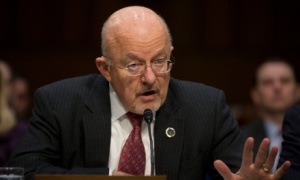By Greg Thielmann
On Jan. 29, The Director of National Intelligence, James Clapper, provided testimony to the Senate Select Committee on Intelligence implicitly contradicting the arguments of those criticizing the Joint Plan of Action now being implemented by Iran and its six negotiating partners.
 Director of National Intelligence James Clapper testifies on Wednesday, Jan. 29, 2014, before the Senate Intelligence Committee hearing. (AP Photo/Pablo Martinez Monsivais)
Director of National Intelligence James Clapper testifies on Wednesday, Jan. 29, 2014, before the Senate Intelligence Committee hearing. (AP Photo/Pablo Martinez Monsivais)
Clapper repeated the conclusion, first published in a 2007 national intelligence assessment, that "...Iran has the scientific, technical, and industrial capacity to eventually produce nuclear weapons." In spite of its assessed nuclear weapons capability, Clapper acknowledged that: "We do not know if Iran will eventually decide to build nuclear weapons."
In presenting the intelligence community's "Worldwide Threat Assessment," Clapper said the Joint Plan of Action, if fully implemented, will:
- Temporarily halt the expansion of [Iran's uranium] enrichment program;
- Eliminate its production and stockpile of 20-percent enriched uranium in a form suitable for further enrichment; and
- Provide additional transparency into its existing and planned nuclear facilities, which would provide earlier warning of a breakout using these facilities.
Clapper reported that, in spite of Iranian progress in expanding its uranium enrichment capabilities over the past year, the intelligence community still assesses that "Iran would not be able to divert safeguarded material and produce enough [weapons grade uranium] for a weapon before such activity would be discovered."
Clapper also stood by the judgment he voiced last week that "new sanctions now would undermine the prospects of a successful comprehensive nuclear agreement with Iran." He further characterized the imposition of additional sanctions right now as "counterproductive," something that "would jeopardize the agreement." Moreover, in response to a question at the hearing, he agreed with the statement of Sen. Angus King (I-ME) that new sanctions now were not needed as leverage; it was the knowledge that Congress can impose them that provided Iran the incentive to comply with the agreement.
By offering these measured but unambiguous U.S. intelligence community judgments, Clapper's annual threat assessment testimony provided strong support for the Nov. 24 Joint Plan of Action negotiated by Iran and the P5+1 countries. It also squarely contradicted the stated rationale for S.1881, the new sanctions bill authored by Sen. Robert Menendez (D-NJ) and Sen. Mark Kirk (R-IL).
It is the responsibility of the intelligence community to bring to bear the best resources within and outside government in objectively assessing the nature of Iran's nuclear proliferation threat and the likely reaction of the Iranian leadership to U.S. policy actions. Indeed, the bottom line reached by Clapper tracks well with the independent views of American experts on Iran and on nuclear proliferation.
There are many difficult policy decisions ahead on how to fill in the details of the comprehensive deal to be negotiated during implementation of the ongoing interim phase, which began Jan. 20. But for now, appreciation for the progress made in reaching the interim phase agreement and the need for scrupulous adherence to its terms in reaching a final agreement is growing.
A comprehensive agreement between the P5+1 and Iran can and should establish verifiable limits on Iran's nuclear program that, taken together, substantially increase the time it would take for Iran to break out of the nuclear Nonproliferation Treaty (NPT) and build nuclear weapons, increase the ability of the United States and the international community to promptly detect and effectively respond to any attempt to break out of the NPT and build nuclear weapons, and decrease Iran's incentive to pursue nuclear weapons in the future.
